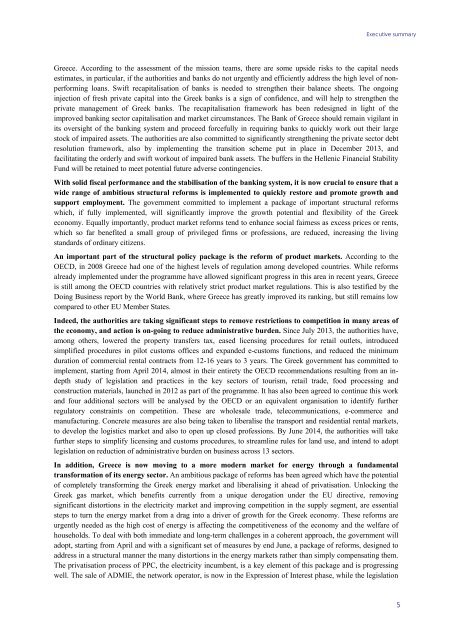ocp192_en
ocp192_en
ocp192_en
Create successful ePaper yourself
Turn your PDF publications into a flip-book with our unique Google optimized e-Paper software.
Executive summaryGreece. According to the assessm<strong>en</strong>t of the mission teams, there are some upside risks to the capital needsestimates, in particular, if the authorities and banks do not urg<strong>en</strong>tly and effici<strong>en</strong>tly address the high level of nonperformingloans. Swift recapitalisation of banks is needed to str<strong>en</strong>gth<strong>en</strong> their balance sheets. The ongoinginjection of fresh private capital into the Greek banks is a sign of confid<strong>en</strong>ce, and will help to str<strong>en</strong>gth<strong>en</strong> theprivate managem<strong>en</strong>t of Greek banks. The recapitalisation framework has be<strong>en</strong> redesigned in light of theimproved banking sector capitalisation and market circumstances. The Bank of Greece should remain vigilant inits oversight of the banking system and proceed forcefully in requiring banks to quickly work out their largestock of impaired assets. The authorities are also committed to significantly str<strong>en</strong>gth<strong>en</strong>ing the private sector debtresolution framework, also by implem<strong>en</strong>ting the transition scheme put in place in December 2013, andfacilitating the orderly and swift workout of impaired bank assets. The buffers in the Hell<strong>en</strong>ic Financial StabilityFund will be retained to meet pot<strong>en</strong>tial future adverse conting<strong>en</strong>cies.With solid fiscal performance and the stabilisation of the banking system, it is now crucial to <strong>en</strong>sure that awide range of ambitious structural reforms is implem<strong>en</strong>ted to quickly restore and promote growth andsupport employm<strong>en</strong>t. The governm<strong>en</strong>t committed to implem<strong>en</strong>t a package of important structural reformswhich, if fully implem<strong>en</strong>ted, will significantly improve the growth pot<strong>en</strong>tial and flexibility of the Greekeconomy. Equally importantly, product market reforms t<strong>en</strong>d to <strong>en</strong>hance social fairness as excess prices or r<strong>en</strong>ts,which so far b<strong>en</strong>efited a small group of privileged firms or professions, are reduced, increasing the livingstandards of ordinary citiz<strong>en</strong>s.An important part of the structural policy package is the reform of product markets. According to theOECD, in 2008 Greece had one of the highest levels of regulation among developed countries. While reformsalready implem<strong>en</strong>ted under the programme have allowed significant progress in this area in rec<strong>en</strong>t years, Greeceis still among the OECD countries with relatively strict product market regulations. This is also testified by theDoing Business report by the World Bank, where Greece has greatly improved its ranking, but still remains lowcompared to other EU Member States.Indeed, the authorities are taking significant steps to remove restrictions to competition in many areas ofthe economy, and action is on-going to reduce administrative burd<strong>en</strong>. Since July 2013, the authorities have,among others, lowered the property transfers tax, eased lic<strong>en</strong>sing procedures for retail outlets, introducedsimplified procedures in pilot customs offices and expanded e-customs functions, and reduced the minimumduration of commercial r<strong>en</strong>tal contracts from 12-16 years to 3 years. The Greek governm<strong>en</strong>t has committed toimplem<strong>en</strong>t, starting from April 2014, almost in their <strong>en</strong>tirety the OECD recomm<strong>en</strong>dations resulting from an indepthstudy of legislation and practices in the key sectors of tourism, retail trade, food processing andconstruction materials, launched in 2012 as part of the programme. It has also be<strong>en</strong> agreed to continue this workand four additional sectors will be analysed by the OECD or an equival<strong>en</strong>t organisation to id<strong>en</strong>tify furtherregulatory constraints on competition. These are wholesale trade, telecommunications, e-commerce andmanufacturing. Concrete measures are also being tak<strong>en</strong> to liberalise the transport and resid<strong>en</strong>tial r<strong>en</strong>tal markets,to develop the logistics market and also to op<strong>en</strong> up closed professions. By June 2014, the authorities will takefurther steps to simplify lic<strong>en</strong>sing and customs procedures, to streamline rules for land use, and int<strong>en</strong>d to adoptlegislation on reduction of administrative burd<strong>en</strong> on business across 13 sectors.In addition, Greece is now moving to a more modern market for <strong>en</strong>ergy through a fundam<strong>en</strong>taltransformation of its <strong>en</strong>ergy sector. An ambitious package of reforms has be<strong>en</strong> agreed which have the pot<strong>en</strong>tialof completely transforming the Greek <strong>en</strong>ergy market and liberalising it ahead of privatisation. Unlocking theGreek gas market, which b<strong>en</strong>efits curr<strong>en</strong>tly from a unique derogation under the EU directive, removingsignificant distortions in the electricity market and improving competition in the supply segm<strong>en</strong>t, are ess<strong>en</strong>tialsteps to turn the <strong>en</strong>ergy market from a drag into a driver of growth for the Greek economy. These reforms areurg<strong>en</strong>tly needed as the high cost of <strong>en</strong>ergy is affecting the competitiv<strong>en</strong>ess of the economy and the welfare ofhouseholds. To deal with both immediate and long-term chall<strong>en</strong>ges in a coher<strong>en</strong>t approach, the governm<strong>en</strong>t willadopt, starting from April and with a significant set of measures by <strong>en</strong>d June, a package of reforms, designed toaddress in a structural manner the many distortions in the <strong>en</strong>ergy markets rather than simply comp<strong>en</strong>sating them.The privatisation process of PPC, the electricity incumb<strong>en</strong>t, is a key elem<strong>en</strong>t of this package and is progressingwell. The sale of ADMIE, the network operator, is now in the Expression of Interest phase, while the legislation5


